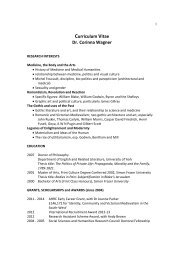'Cast out into the hellish night': Pagan Virtue and ... - Humanities
'Cast out into the hellish night': Pagan Virtue and ... - Humanities
'Cast out into the hellish night': Pagan Virtue and ... - Humanities
Create successful ePaper yourself
Turn your PDF publications into a flip-book with our unique Google optimized e-Paper software.
Philippa Byrne Ex Historia 60<br />
can be no virtue, because predicated on false beliefs, is thus far from surprising. Yet his denial of<br />
ethical value to ancient moral systems is striking when compared to Bruni’s defence of Aristotle<br />
<strong>and</strong> Plato. Asked whe<strong>the</strong>r those philosophers had been good men, Bruni replied: ‘did <strong>the</strong>y live<br />
according to <strong>the</strong>ir own custom? As if indeed virtue <strong>and</strong> moral seriousness were not <strong>the</strong> same as<br />
<strong>the</strong>y are now!’ 53 For Valla, virtue had indeed always been <strong>the</strong> same, but it had never been known<br />
to Aristotle or Plato.<br />
The Golden Age <strong>and</strong> Poetic Allegory<br />
Valla dismantled one scheme of history, <strong>the</strong> myth of virtuous republican Rome <strong>and</strong> its heroes.<br />
He has an alternative historical narrative in mind: <strong>the</strong> notion of a lost ‘golden age’. The golden<br />
age was a potent <strong>and</strong> powerful concept in <strong>the</strong> century after Valla, most notably featuring in Giles<br />
of Viterbo’s panegyrics celebrating Pope Julius II, under whose rule it was said that <strong>the</strong> golden<br />
days returned to Rome. 54 Valla, however, does not celebrate a ‘renewed’ golden age, but instead<br />
locates it in <strong>the</strong> distant past: ‘before <strong>the</strong> Cretan king [Jupiter] held sceptre, <strong>and</strong> before a godless<br />
race banqueted on slaughtered bullocks […] golden Saturn lived on earth’. 55<br />
Yet this wistful<br />
invocation of a pre-Christian era of bounty raises fur<strong>the</strong>r questions: how can Valla accommodate<br />
such a golden age <strong>into</strong> a Christian scheme of history?<br />
The mythology of <strong>the</strong> golden age derives from classical literature <strong>and</strong> a commentary tradition<br />
which runs from Macrobius to Benvenuto da Imola. Ovid’s Metamorphoses had described a<br />
pastoral idyll in which <strong>the</strong> earth provided for all men’s needs. 56 A similar idyll was depicted by<br />
Virgil, who presented <strong>the</strong> ruler Saturn as an inventor who had civilised <strong>the</strong> natives of Latium by<br />
53 Bruni, Isagoge, trans. Griffiths, The Humanism of Leonardo Bruni, pp. 272-73.<br />
54 Charles L. Stinger, The Renaissance in Rome (Bloomington: Indiana University Press, 1985), pp. 293-309;<br />
John W. O’Malley, Giles of Viterbo on Church <strong>and</strong> Reform: A Study in Renaissance Thought (Leiden: Brill,<br />
1968), pp. 101-17.<br />
55 Virgil, Georgics, 2 vols, trans. by H. R. Fairclough (London: Heinemann, 1916), II, lines 532-40, I 174-75.<br />
56 Ovid, Metamorphoses, 2 vols, trans. by Frank Justus Miller (London: Heinemann, 1977), I, lines 113-143, II,<br />
8-11.









